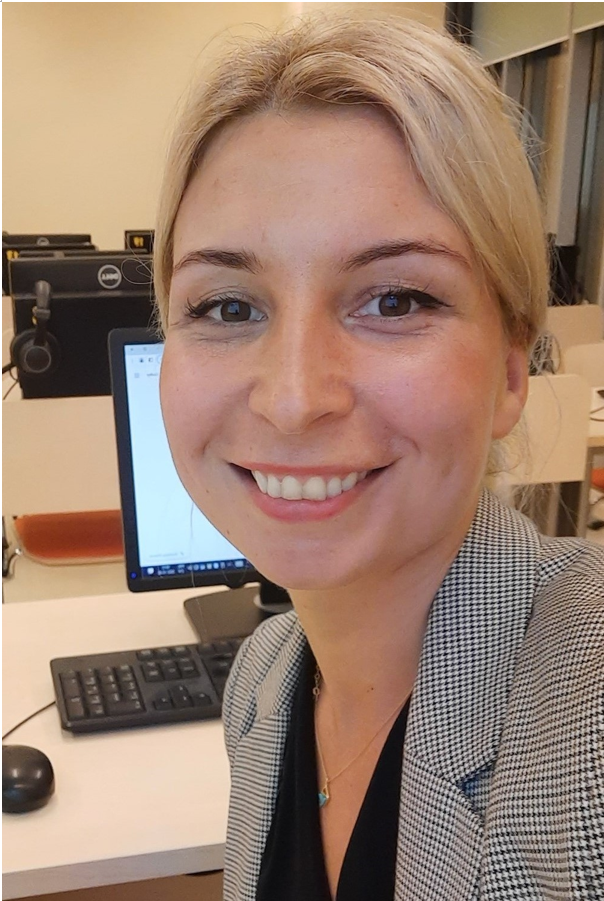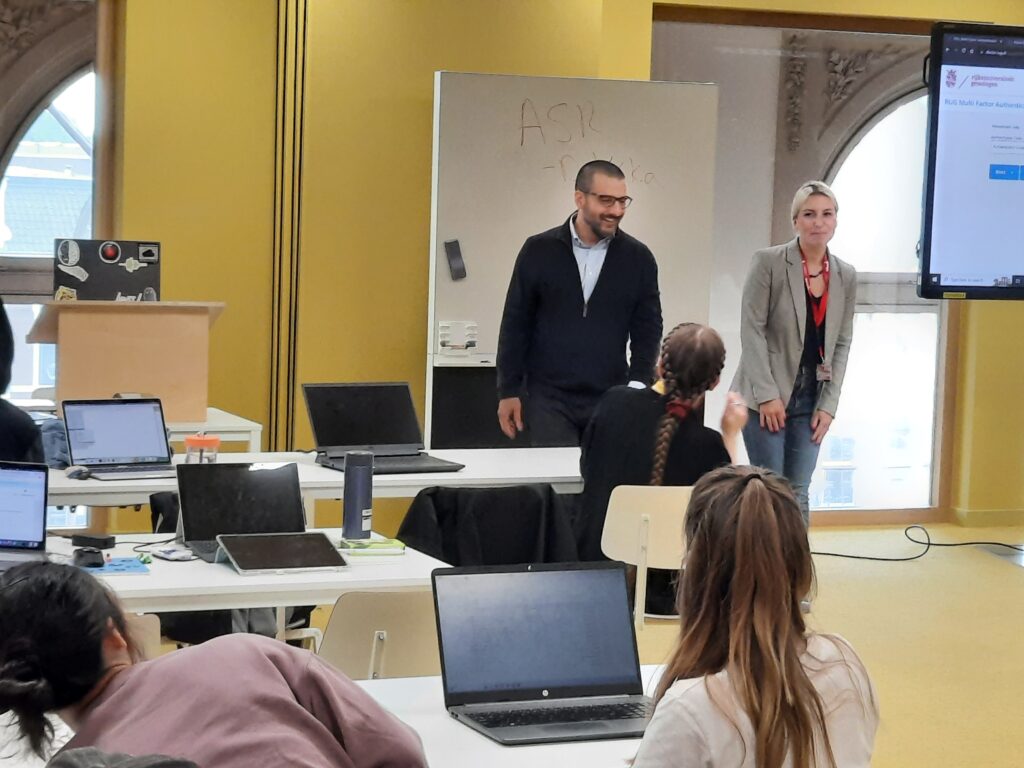“How can users of the endangered, selected Inner Asian and Southeast Asian languages benefit from voice technologies?”
Short Term Scientific Mission (STSM) interview with Dr Dolińska and Dr Coler
LITHME STSM grantee Dr Joanna Dolińska is an Assistant Professor at the University of Warsaw. She is a researcher with multidisciplinary interests. On the one hand, she is a linguist with expertise in Mongolic and Tungusic languages, as well as in the minority languages spoken in Thailand. On the other hand, she has over 5 years of experience in working in the field of computational linguistics and automatic speech recognition. A Short-Term Scientific Mission grant hosted by Dr Matt Coler, Director of the MSc Voice Technology at the Campus Fryslân, offered her the opportunity not only to further develop her skills in voice technology, but also to foster collaboration with other AI experts from the University of Groningen.
“I joined this program because I find it very innovative. At the same time I am convinced that during my research stay at the University of Groningen I expanded my knowledge about carrying out automatic speech recognition research with the focus on endangered languages. Furthermore, I familiarised myself with the current ethical standards that are already applied by speech technology developers,” she says.
“If we want to cooperate with the communities who speak endangered languages and to develop new technologies which support the documentation of these languages, we need to make sure that we understand the needs of these communities and that our engagement in these activities is welcome”, says Dr Dolińska.
“I think that nowadays many endangered languages, just like endangered species of plants and animals, are exposed to extinction. Modern technology tools can support endangered language communities in their efforts to document and revitalise their linguistic and cultural heritage.
Dr Dolińska also shared her perspective on language technologies: “I believe that working with modern language technologies requires not only technological skills and experience, but also linguistic knowledge and cultural sensitivity. If we work on modern technologies for endangered languages, I think that we need to know the language which we work with at least to some extent, so that we can understand the comments, suggestions and doubts of the language community with whom we are working on developing these modern tools. I am very happy that so far I have been able to use my linguistic and computational skills in my academic work and at the same time I am looking forward to expanding my expertise in these fields in the future.”
Dr Dolińska contacted Dr Matt Coler, Associate Professor and Director of the MSc. Voice Technology at the University of Groningen. Dr Coler was enthusiastic about the prospect of hosting her as a guest lecturer in the master’s program during her STSM. They discovered mutual interests which inspired Dr Dolińska to further discover new technologies and trends in the field of voice technologies. Dr Dolińska’s goal was to help MA students understand how their engagement in voice technology could support endangered language communities on the linguistic, cognitive, and cultural levels.
“In our program we want to teach students to think more about who the speech technology is for, who we are working with, what the scope of the technological intervention is and what it is supposed to do. In other words, it is not just as an exercise that one can achieve technically speaking, but a curated sensitivity” explains Dr Coler.
He believes that the STSM visit of Dr Dolińska is just what LITHME COST Action is for. It is a clear example of how language and technology merge together through this type of collaboration.
“I think that this type of collaboration is relatively unusual in the field. As voice technologists and speech technologists, we have our own challenges. We have our own conferences and very rarely do we intersect with documentation and revitalization linguists, ethnographers and anthropologists,“ says Dr Coler.
He continues to explain the meeting of the two fields: “After hearing about Joanna’s background, you might think that what she is doing is very focused on small language communities. Why would such content be interesting for a speech technology master’s program, which is much more technological? Nevertheless, after having carried out some technical exercises, students received considerable exposure to the challenges of the field, and also some sensitivity to linguistic issues that arise.”
Dr Dolińska adds: “I also would like to create a very stable and long lasting cooperation between the University of Groningen, Campus Fryslân, and the Faculty of “Artes Liberales”, University of Warsaw. I am convinced that we have already made the first step towards this goal. Matt has just invited me to participate in a summer school, which will take place next year at the University of Groningen. During this meeting I will be able to present my research findings from my fieldwork in Thailand and also carry out a technical workshop devoted to them. The aim of the workshop will be predominantly to work with languages that the participants of the summer school know apart from English or with those languages which they learned in the past.
Dr Dolińska highly recommends participating in such great grant opportunities as STSM, because they allow for unique opportunities of networking.
“There’s a lot of networking opportunities here that have been successfully facilitated with the STSM project program. It has a lot of advantages for both sides and I will certainly recommend participation in this kind of initiative to other researchers.”
Both Dr Dolińska and Dr Coler are happy about the first steps which they have achieved towards establishing collaboration between the University of Warsaw and the University of Groningen, Campus Fryslân. Moreover, they have already designed a roadmap for serious academic plans and activities, involving participating in a summer school and a possibility of co-supervising an interdisciplinary master’s thesis that covers anthropological and linguistic content alongside AI technical areas.


- Assistant Professor at the University of Warsaw, Faculty of “Artes Liberales”, Center for Research and Practice in Cultural Continuity.
- Specialises in Asian comparative linguistics with special focus on Natural Language Processing (NLP) tools
- She was a Visiting Researcher at the University of Groningen (the Netherlands), Smithsonian Institution (Washington DC, USA), Cambridge University (United Kingdom), University of Strasbourg (France), National University of Mongolian (Mongolia) and Leipzig University (Germany).
- In the previous years she was employed at the Max Planck Institute for the Science of Human History, Jena (Germany) as a Post-Doctoral Researcher in the ERC project “Eurasia3angle”, Technical University of Dortmund (Germany) and in Samsung Electronics (Poland)
- PhD in comparative Altaic linguistics at the Faculty of Oriental Studies, University of Warsaw
- Master’s degree in Applied Linguistics (German and English languages) and Oriental Studies (Mongolian and Tibetan languages)
- She is currently leading the project “Interdependence of multilingualism and biodiversity in the Chiang Mai and Satun provinces in Thailand” at the Center for Research and Practice in Cultural Continuity, Faculty of “Artes Liberales”, University of Warsaw
- Additionally, Dr Dolińska has an unwavering passion for learning new languages. She is currently actively learning Thai language

